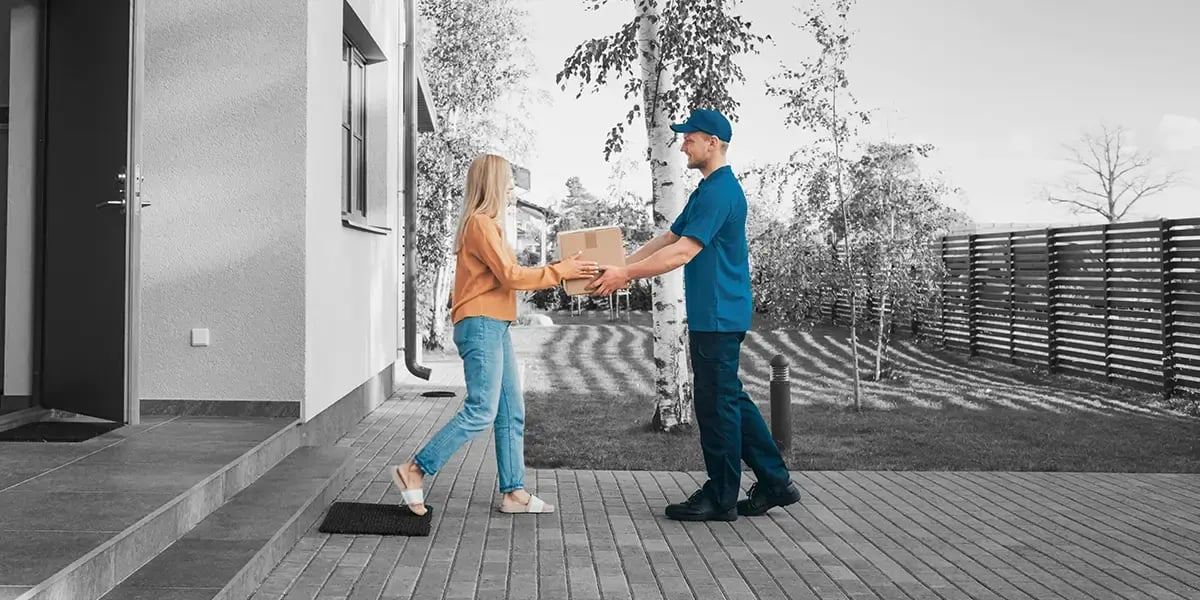
Last update: 23.06.2025
In this blog:
- What is last mile delivery (LMD)?
- What are the challenges of last mile delivery
- What is last mile tracking?
- Further reading: Last mile delivery FAQs
What is last mile delivery (LMD)?
Last mile delivery (LMD) is the final phase of the delivery service where the product is transported from the distribution or transportation hub to the customer.
In the world of online shopping, the importance of the last mile delivery experience is pivotal. Last mile delivery (LMD) – the final phase of the delivery service where the product is transported from the distribution or transportation hub to the customer – is an essential link in the e-commerce chain.
LMD constitutes up to 53% of the overall shipping cost, according to Business Insider Intelligence[1], amplifying the significance of last mile logistics in delivering a cost-effective solution. It's even more pronounced in urban areas, where the density and complexity of routes pose unique challenges to the delivery process, inflating delivery costs.
What are the challenges of last mile delivery
The challenges of last mile deliveries are many, from navigating traffic in urban areas to accessing remote locations in rural areas. However, the evolution of delivery management software is helping businesses and logistics companies turn these challenges into opportunities, ensuring the smooth execution of the final mile delivery process.
One of the primary offerings of delivery management software is its ability to optimize delivery routes and offer choices to customers. By employing advanced algorithms, it navigates through the complexity of urban and rural areas, finds the most efficient routes, and delivers packages promptly, thus reducing delivery times and costs. By connecting to large carrier libraries, delivery management software can offer customers real choice of delivery options to customers. It's a game-changer for businesses looking to build customer loyalty.
What is last mile tracking?
Real-time last mile tracking is another feature that significantly enhances the last mile delivery experience. With consumers demanding transparency, the ability to track orders in real time has become a non-negotiable aspect of online shopping. This feature provides customers with estimated delivery times and alerts them about any unforeseen delays, significantly improving the customer experience.
Effective allocation of resources is a crucial aspect of last mile logistics. Delivery management software accurately assigns tasks based on driver availability, vehicle capacity, and other factors, ensuring optimal utilization of third-party logistics resources.
Not to be understated is the software's ability to provide proof of delivery, promoting accountability and credibility in the last mile delivery services. It collects digital signatures or photographic evidence upon successful delivery, providing a reliable tool for any possible dispute resolution.
Finally, delivery management software's ability to integrate with other systems, such as inventory and customer relationship management, and provide insightful performance analytics makes it an indispensable asset for logistics companies. By making data-driven decisions, businesses can streamline their last mile delivery challenges, offering a superior customer experience.
In summary, as the e-commerce landscape continues to evolve, the role of LMD in shaping the online shopping experience is increasingly significant. Delivery management software is at the forefront, helping businesses navigate the challenges of last mile deliveries, delivering a cost-effective and efficient final-mile delivery experience.
Deliver every order with speed, accuracy, and confidence
nShift powers every shipment with automation, carrier precision and full tech stack integration, all through the world’s most connected delivery platform.
Discover moreFurther reading: Last mile delivery FAQs
What is a last mile delivery station?
A last mile delivery station is a localized facility where packages are sorted and organized for final delivery to customers. It acts as a distribution hub, bridging regional warehouses and end destinations. These stations are key to ensuring timely and accurate deliveries. They streamline the last step in the logistics process, enhancing efficiency and customer satisfaction.
Where is a last mile delivery station?
A last mile delivery station is typically located near densely populated areas to minimize travel distance for delivery vehicles. Companies strategically place them in urban neighborhoods or on city outskirts where they can efficiently serve multiple locations. Their placement is designed to optimize delivery routes and reduce final-mile transit times.
How long does last mile delivery take?
The time for last mile delivery varies based on distance, traffic, and logistics efficiency, but it’s generally completed within 1-2 days. Same-day and next-day delivery options are increasingly common for urban areas. Factors like order volume, weather, and recipient availability can also influence delivery timeframes.
Why is last mile delivery so expensive?
Last mile delivery is costly because it involves multiple stops to deliver small batches of orders, requiring significant labor and fuel. Urban congestion and the rise in consumer demand for faster deliveries add to operational costs. Additionally, handling processes, customer location variability, and failed delivery attempts further drive expenses.
How to reduce last mile delivery costs?
Costs can be reduced by optimizing delivery routes using advanced technology and GPS-based solutions. Consolidating shipments and offering pickup points or lockers minimize unnecessary stops and fuel usage. Leveraging electric vehicles or eco-friendly options also cuts fuel expenses while supporting sustainability initiatives.

Author
Gregory Mannix
Delivery Expert
With over 20 years of experience in SaaS, ecommerce, and logistics, Greg Mannix helps retailers and logistics providers streamline delivery operations. His expertise includes optimizing carrier management, enhancing tracking visibility, and simplifying returns to improve efficiency and customer satisfaction.

About the author
Gregory Mannix
Delivery Expert
With over 20 years of experience in SaaS, ecommerce, and logistics, Greg Mannix helps retailers and logistics providers streamline delivery operations. His expertise includes optimizing carrier management, enhancing tracking visibility, and simplifying returns to improve efficiency and customer satisfaction.





